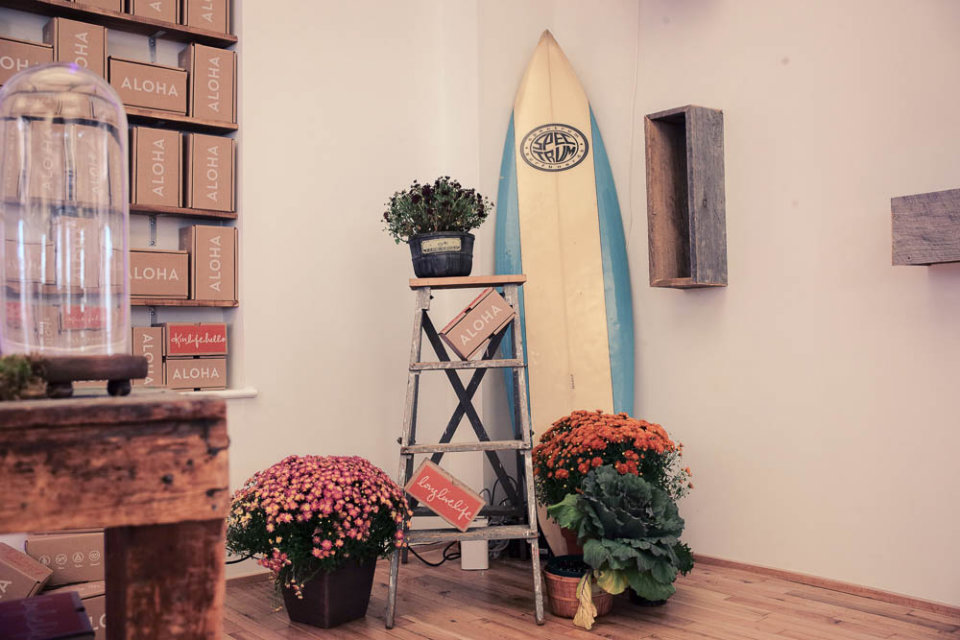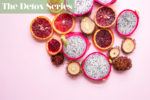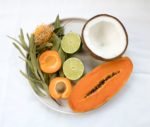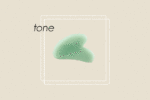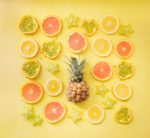Constantin Bisanz from Aloha
The founder of ALOHA takes a pause from changing the world one greens powder at a time to share his tips for a healthy office environment – and life! – with Rebecca Leffler
Constantin Bisanz, the founder of ALOHA takes a pause from changing the world one greens powder at a time to share his tips for a healthy office environment – and life! – with Rebecca Leffler
Just down the street from NYC’s bustling Union Square and up a small elevator lies an oasis of joy and zen.
It’s early in the morning and the staff are all hard at work, staring at their computer screens as some sip thick green smoothies out of glass jars, others scoop chia pudding out of BPA-free containers and still others enjoy some gluten-free toast in the company’s vast in-house kitchen space. There are a dozen yoga mats rolled up in one corner, dumbells on the floor in another and surf boards standing up next to grassy knolls in the center of the room. There are palm trees and flowers everywhere and large windows allow natural light to permeate the wide open space. Fancy glass display jars protect the family jewels, aka white tins filled with protein powder. No one appears over the age of 35 (or perhaps they’re actually 65? Behold, the power of superfoods.) In the conference room, tall glasses of filtered water sit opposite stacks of tiny green packets containing mysterious green powder inside.
Welcome to the wonderful world of Aloha. Think: Willy Wonka’s Chocolate Factory, only this time we’re talking cacao-flavored dried green juice.
Welcome to the wonderful world of Aloha. Think: Willy Wonka’s Chocolate Factory, only this time we’re talking cacao-flavored dried green juice. The Willy Wonka in question is Austrian entrepreneur, athlete and health enthusiast Constantin Bisanz who founded the company in 2013. After becoming frustrated with the lack of quality health products on the market, he set out to create his own… armed with $4.5 million from investors.
Bisanz is no stranger to the start-up world. He founded five companies, starting when he was just 14 years old. The Harvard Business school grad sold fashion e-commerce site Brands4friends to eBay in 2011 for $200 million. He set off on a two-year journey to travel the world and spent a great deal of time in India where he studied Ayurveda. Side note: Along the way he also managed to set a record for kite-boarding. True story. When this athletic Ayurveda master returned to NYC, he became frustrated by how hard it was to stay healthy in such an urban metropolis and set out to change the world one green juice powder at a time.
Apple made computers cool. We want to do the same thing for healthy living.
“Apple made computers cool. We want to do the same thing for healthy living,” Bisanz explains. Thanks to a sleek design aesthetic and support from famous friends and the fashion crowd, healthy living is indeed getting a makeover à la Aloha.
His strategy? “Step by step.”
“We want to fix the basics first.,” Bisanz says talking about vitamins, minerals and fiber that he proposes in the form of two product lines, The Daily Good and Foundation.
The greens powders are a mélange of the usual green suspects (think: spirulina, spinach, wheatgrass…), some colorful plant-based cousins (organic raspberries, organic wild blueberries, wild-harvested coconut water…) and more hard-to-pronounce (but easy-to-digest) foods like sustainable moringa, organic king trumpet mushrooms and Hawaiian red alea salt. They are different from other greens powders (14 real fruits and vegetables are dried through a patented process instead of being freeze-dried like most powders on the market) and from popular cold-pressed green juices (Aloha powders also include the fiber from the fruits and vegetables).
They now boast chocolate and berry flavors and plan to introduce a protein powder in the coming months.
Bisanz is very attentive to not only the taste and quality of the products, but also to where they come from and how they are made from start to finish. You’re not just drinking your greens, you can learn exactly where each and every ingredient comes from. Think of The Daily Good as a geography lesson, a family photo album and a visit to the doctor all in one tiny packet.
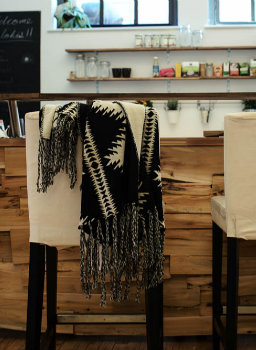
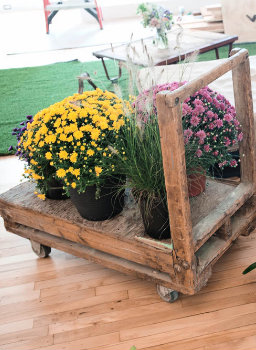
The company’s name comes from the Hawaiian word that means sharing the breath of life.
The company’s name comes from the Hawaiian word that means “sharing the breath of life.” The company was founded on five “pillars” : relax, connect, think, move, nourish. Every day of the week, employees focus on a different pillar. “Move Mondays” may involve team workouts at Soul Cycle or Pure Yoga, on connect Thursdays they have drinks together or enjoy a healthy lunch out on nourish Fridays. And when they’re not working on community bonding, Aloha team members can escape to the in-house meditation room.
“Everybody who we hire has to be born to change the world. Not just people looking for a 9-5 job. Our people are sensitive to what we do and really passionate,” Bisanz explains of his strict hiring process. Bisanz also wants his employees to walk the walk (or in their case, perhaps jog, spin or crossfit) and talk the healthy talk that they promote.
Bisanz does yoga every day on his own or in a class, strength training twice a week and cardio four times a week. And no matter how busy he is, he always finds time to meditate. Even if it’s in the middle of a trendy NYC gym instead of an ashram in India.
“People look at me like ‘what is he doing?’ But I feel good so who cares?” he says. He also practices what he preaches and drinks the Aloha powdered drinks all day long. “I’ll drink up to four at a time during a long meeting,” he confesses.
Bisanz aims to combine state of the art, innovative technology with usability and design. “That’s what we stand for – easy to use, cool design, and fun.” He adds: “Our long-term mission is that middle America realizes that it’s actually cooler to do something healthy than to drink diet Coke.”
Not everyone is surrounded by hundreds of health professionals and has access to fresh fruits and vegetables. Aloha’s goal is to take these luxuries and bring them to the people.
However, he knows that Rome wasn’t built in a day. Neither was kale.
Aloha focuses on its magazine, a platform for their “friends,” everyone from celebrities like Bobbi Brown — to kaleebrities, health and wellness powerhouses like Sarma Melngailis, Latham Thomas and Gabrielle Bernstein. “We’ll never make money off of the magazine. It’s our way to give people that we like a stage where they can shine and tell their amazing stories,” he says of his contributors. Not everyone is wealthy, surrounded by hundreds of health professionals and has access to fresh fruits and vegetables. Aloha’s goal is to take these luxuries and bring them to the people. “We want to change the world by helping people to live healthier lives. We want to democratize Ayurveda and translate it in a very simple way to everybody,” Bisanz explains.
And because you have to drink it to BWBelieve it, try Aloha out for yourself with a special 10% off discount: PROMOCODE greenchic
Bon sip-étit ! Aloha.com
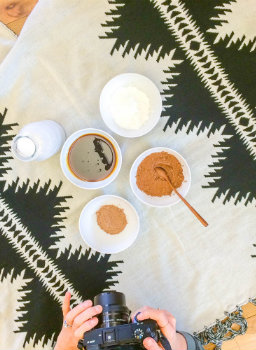
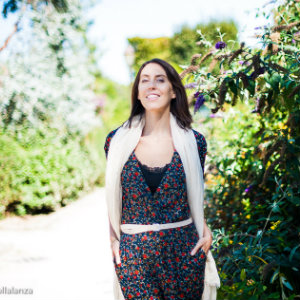
Rebecca Leffler is a Paris-based writer and journalist who, after a career as the French correspondent for The Hollywood Reporter and as a film critic on Canal+, traded red carpets for green smoothies. She’s written five books about healthy lifestyle from Paris to NYC and beyond, including Très Green, Très Clean, Très Chic: Eat (and Live!) the New French way with plant-based, gluten-free recipes for every season, and most recently Le Nouveau Manuel de la Cuisine Végétale. Rebecca has pioneered the “vegolution” in Paris, where she continues to organize events focusing on healthy eating, yoga and la vie en rose… And green! You can keep up with Rebecca on Instagram!


